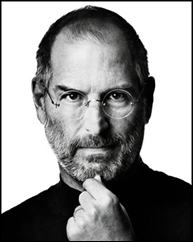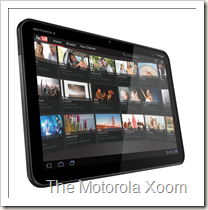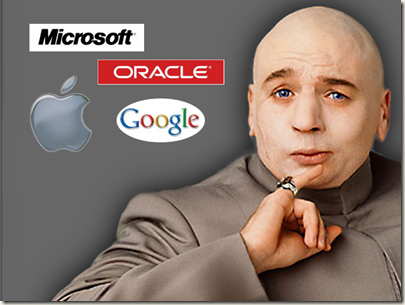Blasphemy or realist: The iPad 2 is…
Ok, so Apple took the wraps off the iPad 2. At lunch today, my friends and I watched the live coverage via scrolling posts and snapshots taken of the event. We did this on my Samsung Galaxy Tab running Android, the irony did not pass me by.
Here’s the root of it:
– On March 11th, the iPad 2 will start shipping.
– Same price as existing iPads (I bet retailers like Best buy aren’t exactly thrilled with this; unless Apple oks them to sell them at a discount).
– Will be available in White.
– Will be very thin (about 9 mm thick) [that’s about 2/5th of a inch]
– Will have front and rear facing cameras
– Will have a dual core CPU (A5 @ 1Ghz)
– Looks like it’ll be the same screen size
– HDMI out via an accessory
– and a screen cover that is held in place with magnets
Oh, and they unveiled some cool apps for making music and editing video.
All I can say is the most impressive thing was that Steve Jobs was well enough to be there. Apple stock should see a bump for that alone.
Computerworld already has a post comparing the iPad 2 and the Motorola Xoom. The post proclaims the Xoom the clear winner, but I say not so fast. Pound for pound, the iPad 2 will be a better value than the pricier Xoom. I’m not saying the Apple iPad 2 is the 2011 king of tablets either, though.
Facebook is scrolling with people proclaiming their love for the new iPad 2, and how much they want one. My question is, why? What about the iPad 2 is so remarkable in today’s white hot tablet market? Yes, it’s thinner, lighter, and faster than the old iPad; but is that enough to cause a stampede of Apple  fanatics to ditch their old iPad for a new one?
fanatics to ditch their old iPad for a new one?
The specs are similar to that of the Xoom, the Android tablet du jour.
However, my expectation of Apple is little higher. I expected them to raise the bar. Instead, they slid underneath it like drunk tourist doing the limbo on the deck of a cruise ship. During the presentation they made a big deal about how they tweaked iOS 4.3 to allow the user to choose what the switch did. Oh, the glory! Apple has such a tight reign on environment that allowing a user to define what a button does is worthy of announcement. Let that sink in. Especially you educators.
Dual core CPU, cameras, and a gyroscope are all great improvements, but they’re pretty much standard flair on the avalanche of Android tablets in the pipeline.
HDMI output to the TV is great, but many phones already do this. Apple pointed out that you can charge AND watch HDMI out at the same time. In the words of Bill Murray in Caddyshack, “So I got that going for me”.
AND watch HDMI out at the same time. In the words of Bill Murray in Caddyshack, “So I got that going for me”.
The weight and thickness are great. The iPad 2 is only 2/3rds as thick as the Xoom. Weighing in at only 590 grams is impressive also.
The Xoom, for example, weights 730 grams – a whole 150 grams more.
I completely understand the appeal of the Apple products. Their closed marketplace generates incredibly impressive numbers for both stockholders and fanatics alike. For example, they announced they’d sold 100M iPhones so far. That’s seriously impressive, but Apple is the only company from whom you can buy an iPhone.
For perspective on this, consider that in 2007 1.1 BILLION cell phones were sold globally; the year the first iPhone was launched. That’s 5 years ago. Which means if cell phone sales held stead at 1 Billion a year (which it hasn’t, it’s increased), there were 5,000,000,000 phones sold since 2007. Which means .02% of all cell phones sold in the past 5 years are Apple. That’s extremely impressive in it’s own right, but sort of makes the 100,000,000 number seem a little less impactful.
Everything aside, I’m really not blown away. Is it going to be a great product? You bet! I really do like Apple products. I love my Mac Mini. What a great PC! However, I think Apple is being seriously out-maneuvered in the tablet space; and if they’re not careful they’re going to be left in the dust in the mobile space as well. I expected to see more; like better wireless tech, replaceable battery perhaps, or some type of innovation which, lately, Apple has earned a reputation of delivering.
However, when Apple’s latest product is an “also ran” from a specifications standpoint that should tell us something. Another tell-tale signal was Steve Jobs saying that comparing tablets based on technical specifications is a mistake. I was shocked to hear that, but I can understand why he said it. After an earlier jab at the Samsung Galaxy Tab’s “out sell” numbers, you can tell which major consumer electronics manufacturer Apple is most afraid of.
Apple’s model served them well when the mobile market was dominated by the cheapest phone consumers could buy running a heavily fragmented environment (J2ME). Apple’s model, though, tends to suffer in the long term to open market competition from major manufacturers. They’re too closed, too controlling, and perhaps too greedy to maintain market dominance. Slow hardware release cycles can hurt market share if the technology released doesn’t leap-frog the existing market.
Again, remember when Apple owned the education market? In November 2000, Dell overtook Apple’s lead in schools. Will history repeat itself?
I don’t think 2011 will be the year of the iPad 2. I think 2011 will be the year of the Android. This fall will be most interesting and telling.
Get a little green for thinking green
Remember when we were kids and we’d ask our neighbors for odd jobs to make a buck or two? I spent many a summer picking leaves out of flower beds or mowing lawns under the hot Texas sun trying to make a little dough. All of this work was probably good for me, but like most kids I dreamt of ways to make money centered on a passion of mine. Comic books and role playing games frequently where the focus of poor business plans. Yes, I am a nerd.
 In today’s world, we’re told to think globally and act locally. Well, a startup founded by Mark Bowles has made an ATM that pays you cash for your old cell phones. It’s called the ecoATM.
In today’s world, we’re told to think globally and act locally. Well, a startup founded by Mark Bowles has made an ATM that pays you cash for your old cell phones. It’s called the ecoATM.
Cell phones are ubiquitous on a global basis. Recently, the number of mobile devices outsold the number of PCs. Remember all the brouhaha regarding PCs and land fills? How companies were getting into trouble shipping their electronics off to China for disposal? Cell phones are smaller and can enter a landfill buried in used kitty litter, and no one would be the wiser.
This is bad because cell phones have all kinds of toxic elements in them. Mercury and brominated flame retardants can be found on circuit boards. Mercury can also be found in batteries. The chips, resistors, capacitors, and circuit boards all have chemicals in or on them that really should be disposed of differently than burying it.
Well, the ecoATM will take that old cell phone off your hand and give you cash in exchange.
Next thing you know, there will be kids knocking on your door to asking for your old cell phones.
UK rules that open standards must be royalty free
This is a positive development in the realm of intellectual property. Lately, large tech companies like Microsoft, Oracle, Google, and Apple have pushed standards bodies to adopt their technology as standards. Such actions are blatantly contrary to the spirit of standards.
 Now, in the UK, an open standard is defined as royalty free. Basically, this is tremendous benefit to the UK taxpayer because it means the government will be able to use open standards and not have to pay a royalty to do so. The Internet is built on “open standards”. Things like DNS, TCP/IP, and HTML are all examples of a “standard”. Without such standards, the Internet wouldn’t be able to function. They define the rules for how disparate systems will communicate to each other and to users.
Now, in the UK, an open standard is defined as royalty free. Basically, this is tremendous benefit to the UK taxpayer because it means the government will be able to use open standards and not have to pay a royalty to do so. The Internet is built on “open standards”. Things like DNS, TCP/IP, and HTML are all examples of a “standard”. Without such standards, the Internet wouldn’t be able to function. They define the rules for how disparate systems will communicate to each other and to users.
Such standards are defined and managed by what are called standards bodies. You can think of them as a committee of propropellar heads who all debate the merits of changes to an existing standard or the creation of a new one. In the past, this we done in the spirit of usability, openness, and cooperation.
a new one. In the past, this we done in the spirit of usability, openness, and cooperation.
Today, though, the process has been polluted much in the way Washington is. “Special Interests” in the form of major corporations lobby and use just about dirty trick in the book to influence a standard. Why would they do this? Because if they can get the standards body to approve a technology that depends on, requires, or is outright a technology that is own wholly by a company, they can charge all their competitors a royalty to use it.
Sound unfair? It’s not fair; but it happens all the time. Such activities where recently at the center of hotly debated controversies revolving around an international effort to define a standard document format. The goal was to create a file format that would be considered the “standard”. By defining the standard, software users would have an easy way to exchange documents without having to worry about layout, display, printing, etc. Sounds great, doesn’t it? You’d never have to ask someone what version of word they were using, or be concerned about mailing a document to someone and them not being able to open it. What a great goal!
The reality, however, is different. Large companies got in to a huge fight trying to get their format defined as the standard. Microsoft successfully got their technology defined as the standard. Who cares? You should. Because if one company can influence a standard to their direct financial benefit, it stifles competition and isn’t really a standard at all. Instead, it’s a way for a company to own and charge for an activity that every user on the Internet participates in.
 This UK ruling prevents that. Every country should adopt a similar law. Standards should win on the their technical merit and benefit to the online community. They should not be yet another way for large companies to force people everywhere to bend to their will.
This UK ruling prevents that. Every country should adopt a similar law. Standards should win on the their technical merit and benefit to the online community. They should not be yet another way for large companies to force people everywhere to bend to their will.
To be clear, I’m not against large companies submitting technology as a standard. This is a good thing! When they are submitting it as a standard, the company should forfeit the rights and the ability to charge for the technology’s use.
